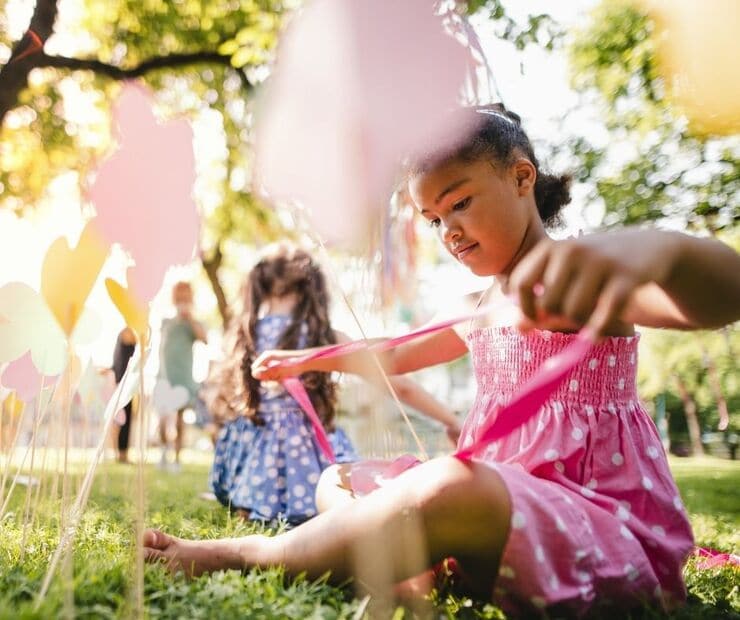
As the weather gets warmer and days grow longer, kids will spend more time outside. Children get to be carefree and make new memories. The benefits of outdoor play go far beyond enjoyment. Playing outside offers many valuable learning and developmental opportunities. Parents and teachers can take advantage of outdoor play to help preschoolers grow.
Here are some benefits of outdoor play:
- Physically Active: Children seem to have boundless energy when they play outside. One benefit of outdoor play is being physically active. Kids get to exercise and have fun simultaneously. Mobility develops fine and gross motor skills and prevents obesity at a young age. When kids play tag, sports, or swim, they build and strengthen muscles. Staying active is important in maintaining good physical health. As preschoolers grow, they also become braver. You’ll see children try new things, like jumping or swimming underwater.
- New Observations: When walking outside with preschoolers, let them channel their curiosity. Children can observe their outdoor surroundings and ask questions. Adults can point out flowers, types of trees, rocks, clouds, and other scenes. Many kids love blowing bubbles and chasing them. When kids are interested in outdoor play, they’ll want to spend more time doing it.
- Water Play Learning: Kids can cool down and relax in the water on hot days while learning science basics. Pools and splash pads are excellent sources of entertainment. Adults can teach lessons with objects that sink or float and sponges absorbing water. After being wet, children can see and feel water dry from being out in the sun. If you have a chance to go to a beach, kids can add water with sand and see what happens. Sandcastle molds help develop STEM and critical thinking skills. The book Science Activities has fun and educational water play projects for preschoolers.
- Gardening and Growing: Preschoolers can also learn science by going outside and doing minor gardening projects. Kids can plant seeds, water a flowerbed, or till the soil. Gardening lessons teach children about growth and what nutrients plants need.
- Physical Health: Sunlight is a natural source of Vitamin D, which strengthens bones, muscles, and teeth. When planning outdoor play sessions, ensure protection to prevent sun damage.
- Teamwork and Socializing: Outdoor play strengthens a child’s social and emotional skills. Sports develop collaborative team players by learning to work together positively. Friendships will form among kids and their parents during extracurricular outdoor activities. When part of a team, there will be loss and poor performance, impacting self-esteem. Children are sensitive and vulnerable at a young age. Adults can offer encouragement during these moments.
- Disconnecting from Devices: One of the best benefits of outdoor play is that children are offered an escape. Instead of staring at screens, kids can go outside and enjoy nature and warm weather. Open space and fresh air are better than being confined inside the house.
- Develop a Routine: If a child attends preschool during the summer, they’ll already have a routine. Kids not in school have more time on their hands, and daily outdoor play can help them settle in at night. After being outside all day, children get tired and sleep better at night. Parents can establish a routine by setting the same bedtime when school starts in the fall.
- Recess for Preschoolers: During the summer, indoor and outdoor activities improve learning in preschool. Breaks and outdoor play improve children’s attention span and productivity.
The benefits of outdoor play help children learn, but adults also enjoy the fresh air. Teachers need to plan for time spent outside. It’s important to have a backup plan if it rains or gets too hot. Also, plan for unstructured activities so that preschoolers can enjoy themselves. Outdoor play is essential for a child’s development and physical and mental health. You can make the most out of the summer simply by having fun.
